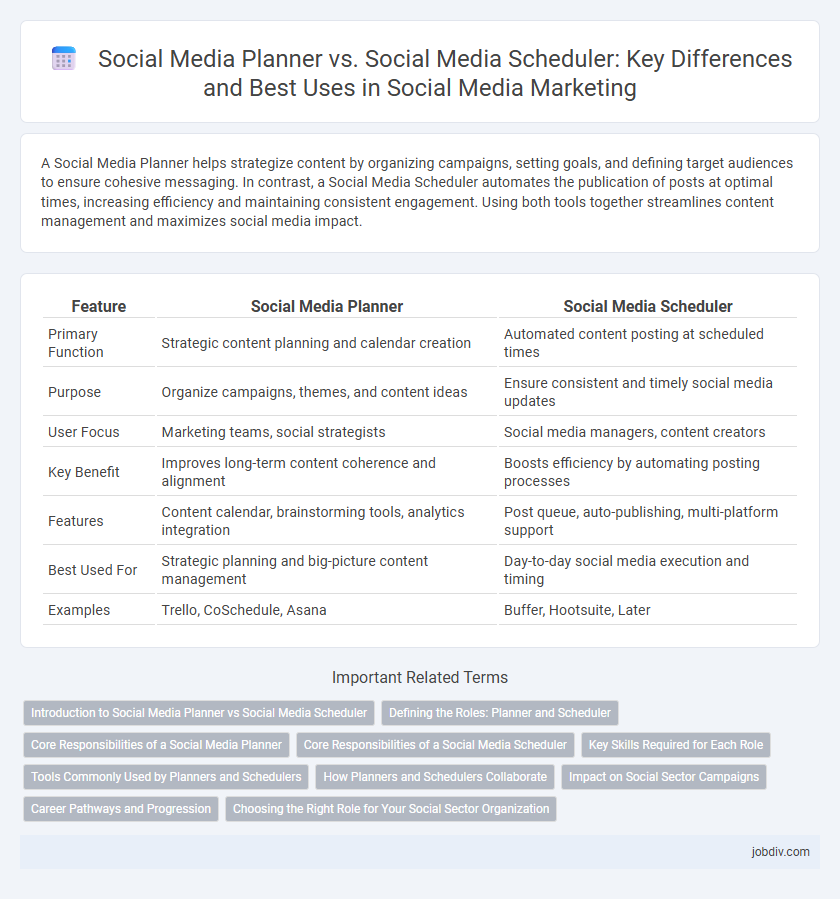A Social Media Planner helps strategize content by organizing campaigns, setting goals, and defining target audiences to ensure cohesive messaging. In contrast, a Social Media Scheduler automates the publication of posts at optimal times, increasing efficiency and maintaining consistent engagement. Using both tools together streamlines content management and maximizes social media impact.
Table of Comparison
| Feature | Social Media Planner | Social Media Scheduler |
|---|---|---|
| Primary Function | Strategic content planning and calendar creation | Automated content posting at scheduled times |
| Purpose | Organize campaigns, themes, and content ideas | Ensure consistent and timely social media updates |
| User Focus | Marketing teams, social strategists | Social media managers, content creators |
| Key Benefit | Improves long-term content coherence and alignment | Boosts efficiency by automating posting processes |
| Features | Content calendar, brainstorming tools, analytics integration | Post queue, auto-publishing, multi-platform support |
| Best Used For | Strategic planning and big-picture content management | Day-to-day social media execution and timing |
| Examples | Trello, CoSchedule, Asana | Buffer, Hootsuite, Later |
Introduction to Social Media Planner vs Social Media Scheduler
Social Media Planners provide strategic frameworks for content creation, audience analysis, and campaign timelines, enabling businesses to align their social goals with marketing objectives. Social Media Schedulers automate posting by queuing content across platforms, ensuring consistent engagement without manual intervention. Understanding the distinction enhances workflow efficiency and maximizes the impact of social media efforts.
Defining the Roles: Planner and Scheduler
A Social Media Planner develops overarching strategies by identifying target audiences, content themes, and campaign goals to ensure coherent brand messaging. A Social Media Scheduler executes this strategy by organizing and automating the timing of posts across platforms to maximize engagement and reach. Distinguishing these roles enhances efficiency and improves the effectiveness of social media marketing efforts.
Core Responsibilities of a Social Media Planner
A Social Media Planner primarily strategizes content themes, designs campaign objectives, and aligns posting schedules with overall marketing goals. They conduct audience research, analyze engagement data, and adjust plans to optimize reach and impact. Unlike schedulers who automate posts, planners focus on the creative and strategic framework behind social media efforts.
Core Responsibilities of a Social Media Scheduler
A Social Media Scheduler primarily focuses on organizing and automating posts across multiple platforms to maintain consistent content delivery. Core responsibilities include setting precise publishing times, managing content queues, and ensuring that posts align with the overall marketing calendar. This role emphasizes efficiency and timing to optimize audience engagement and streamline social media campaigns.
Key Skills Required for Each Role
A Social Media Planner excels in strategy development, content creation, and audience analysis, requiring strong project management and creative thinking skills. In contrast, a Social Media Scheduler focuses on time management, platform-specific tool proficiency, and consistency in posting, demanding technical expertise and attention to detail. Mastery in analytics and adaptability are critical for both roles to optimize social engagement and campaign performance.
Tools Commonly Used by Planners and Schedulers
Social media planners often rely on tools like Trello, Asana, and Notion for strategic content organization, calendar management, and collaborative planning. Schedulers commonly use platforms such as Hootsuite, Buffer, and Later to automate post timing, track engagement metrics, and manage multiple social accounts efficiently. Both planners and schedulers integrate analytics tools like Sprout Social for performance insights, enhancing content strategy and execution.
How Planners and Schedulers Collaborate
Social media planners design comprehensive content strategies that outline themes, target audiences, and posting timelines to ensure consistent brand messaging. Social media schedulers implement these strategies by automating the publication of posts at optimal times across various platforms, enhancing efficiency and reach. Their collaboration integrates strategic foresight with tactical execution, maximizing engagement and campaign effectiveness.
Impact on Social Sector Campaigns
Social Media Planners strategize content themes and posting timelines to maximize engagement and support social sector campaigns' goals, ensuring message coherence and audience targeting. Social Media Schedulers automate post distribution, increasing campaign consistency and freeing time for real-time interaction and adjustments. Effective use of both tools amplifies outreach, mobilizes communities, and drives meaningful social impact.
Career Pathways and Progression
A Social Media Planner focuses on strategizing content, audience engagement, and campaign goals, often leading to roles in digital marketing management or brand strategy. A Social Media Scheduler handles the operational aspect of posting content timely, which can progress into roles such as social media coordinator or community manager. Career pathways in these areas diverge, with planners advancing towards strategic leadership and schedulers gaining expertise in content management and analytics.
Choosing the Right Role for Your Social Sector Organization
Selecting the right role between a Social Media Planner and a Social Media Scheduler is crucial for maximizing engagement and impact in social sector organizations. Social Media Planners develop strategic content calendars aligned with mission-driven goals, while Social Media Schedulers focus on automating post timing to maintain consistent online presence. Prioritizing strategic planning ensures your organization's message resonates effectively with target communities and stakeholders.
Social Media Planner vs Social Media Scheduler Infographic

 jobdiv.com
jobdiv.com